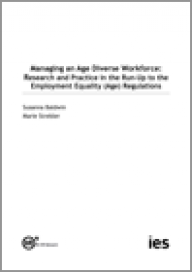Publications
 We author and publish a range of resources to keep you up to date with the latest developments in employment, labour market and human resource policy and practice.
We author and publish a range of resources to keep you up to date with the latest developments in employment, labour market and human resource policy and practice.
All our pdf publications are free to access.
-

Activity and Learning Agreement Pilots - Programme Theory Evaluation (Working Paper 1)
Incentivising Participation in Activity Agreements
Johnson C, Newton B, Usher T, Hillage J | Jan 2008 | Department for Children, Schools and FamiliesThis study investigated the theory that ‘If the net additional value of the incentive was sufficiently appealing, certain young people would sign up to the Activity Agreement (AA), or at least attend an initial discussion where the wider benefits of the AA could be promoted'.
-

Recruitment and Training Among Large National Employers
Bates P, Johnson C, Gifford J | Dec 2007 | Learning and Skills CouncilThis research aimed to inform the Learning and Skills Council's understanding of large national employers' attitudes and practices in terms of recruitment and training.
-

Activity and Learning Agreement Pilots - Programme Theory Evaluation (Working Paper 2)
Signing Up to a Learning Agreement
Johnson C, Page R, Munro M | Dec 2007 | Department for Children, Schools and FamiliesThe Activity and Learning Agreements Pilots were launched in April 2006 in 12 areas of England. Activity Agreements (AA) are for 16 and 17 year olds not in education, employment or training (NEET), who are offered a weekly allowance in return for committing to a plan and completing agreed activities to re-integrate them back in to learning. Learning Agreements (LA) are for 16-17 year olds in jobs with no accredited training (JWT), to support and encourage them back into learning. This study investigated the theory that ‘In LA pilot areas where there is no financial incentive, it is the support, advice and guidance provided by the Connexions worker that will be enough to ‘kick-start’ the young person’s interest in learning and induce them to sign up to a learning agreement.’
-

Impact of Care to Learn - Tracking the destinations of young parents funded in 2003/04
Dench S | Nov 2007 | Institute for Employment StudiesCare to Learn is a UK government initiative that provides financial support for teenage parents who want to continue in, or return to learning. It helps with the cost of their childcare and travel. As part of the national evaluation of Care to Learn, a self-completion postal survey was conducted of young parents who received Care to Learn funding during the 2003/04 academic year. The survey was conducted during the winter of 2006.
-
📄
Impact of the Working Time Directive on Collective Bargaining in the Road Transport Sector
Broughton A | Nov 2007 | European Industrial Relations ObservatoryThis report explores the impact of the Working Time Directive on collective bargaining in the road transport sector. It first gives an overview of the road transport sector across the European Union, looking at its employment structure and collective bargaining actors, processes and issues. It then examines implementation of the directive in different countries and its impact on key areas such as working time, rest breaks and night work, as well as those cases where derogations from the directive are permitted.
-

Evaluation of Year 2 of the Skills Coaching Trials and Skills Passports
Page R, Casebourne J, Mason D, Tuohy S | Nov 2007 | Learning and Skills CouncilIn partnership with the Centre for Social and Economic Inclusion, IES evaluated Skills Coaching, a careers and coaching service for out of work adults. The evaluation involved: case-studies in nine of the areas running Skills Coaching trials; a review of literature on employability and employment and skills policy; an analysis of the pilots’ management information; and an assessment of the cost of delivering the service.
-

Paying for Performance
New trends in performance-related pay
Suff P, Reilly P, Cox A | Nov 2007 | Institute for Employment StudiesThis paper examines how performance-related pay (PRP) has evolved in recent years. It uses real-life case studies to demonstrate how new techniques, closely linked to the organisation's unique characteristics and needs, can successfully act as a lever to improve individual performance and organisational effectiveness.
-

Managing an Age Diverse Workforce
Research and Practice in the Run-Up to the Employment Equality (Age) Regulations
Baldwin S, Strebler M | Nov 2007 | Institute for Employment StudiesThis report reviews and summarises the employment literature on age discrimination and diversity that existed at the time the Employment Equality (Age) Regulations came into force on 1 October 2006. This is substantiated by IES research findings on age diversity and discussions with company representatives at an IES HR Network Event in the lead-up to October 2006.
-
📄
Employee Absence and Attendance
Hayday S | Nov 2007 | Institute for Employment StudiesThis opinion paper explores the causes of absence, how to measure and monitor absence, and identifies successful absence management techniques. It advocates policies that not only emphasise preventing 'illegitimate' absence, but also give sufficient priority to those who are 'legitimately' absent and aid their return to work.
-
📄
Employee Engagement
Robinson D | Nov 2007 | Institute for Employment StudiesThis opinion paper explores how IES's research has defined engagement, created an engagement measure and provided an engagement diagnostic tool. It identifies the factors that drive engagement and provides general lessons about how to manage employee engagement in your organisation.
